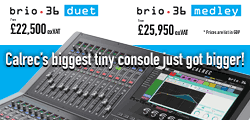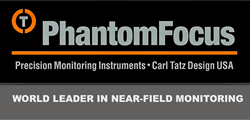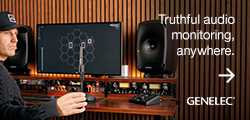Nugen Audio has announced Halo Vision, a customisable, real-time visual analysis plug-in suite operating in up to 7.1.2 channels for the AAX, VST3 and AU formats plug-in for 3D, surround and immersive audio workflows.
 Inspired by Halo Upmix and Halo Downmix, Halo Vision features a variety of modules that provide a clearer understanding of every aspect of a project’s sound. In support of the launch of the software, Nugen has also added a Timecode View module to the plug-in. Among the other available tools are Correlation Matrix, Correlation Web and Spectrum, as well as expanded versions of Nugen’s Frequency Haze and Location Haze functions, and a True Peak meter for each channel.
Inspired by Halo Upmix and Halo Downmix, Halo Vision features a variety of modules that provide a clearer understanding of every aspect of a project’s sound. In support of the launch of the software, Nugen has also added a Timecode View module to the plug-in. Among the other available tools are Correlation Matrix, Correlation Web and Spectrum, as well as expanded versions of Nugen’s Frequency Haze and Location Haze functions, and a True Peak meter for each channel.
These modules support mix engineers in their decision-making and troubleshooting process, allowing them to pinpoint problem areas that might be missed using ears alone. Halo Vision can be customised, re-arranged and resized to suit any specific workflow, for a broad spectrum of immersive sound projects, from music to film.
The latest module, Timecode View, displays the time code of a project in hours, minutes, seconds and frames, providing assistance in determining exact locations of errors in a project. Displaying colour-coded phase relationships between each channel, the Correlation Matrix features a larger arched meter for detailed analysis and anti-correlation alerts at a user-defined threshold. Additionally, the Correlation Web module shows a network of channels with an interconnecting line between each pair, which light up when the phase relationship between the two channels becomes anti-correlated.
With low frequencies at the centre and high frequencies on the outer edge, the circular Frequency Haze displays frequency content across the surround field, with channel labels in typical loudspeaker positions. Further, the Location Haze tool provides a visualisation of the perceived location of the audio, showing energy distribution across the surround field, with brighter sections indicating increases in the strength.
When set to ‘combined’ mode, the Spectrum view displays a level-against-frequency graph for all channels in one spectrum, while the ‘groups’ mode groups channels into separate overlaid spectrums. Finally, the incorporated True Peak Meter provides a dBTP level meter for each channel.









